- Skip to content
Davidson Writer
Academic Writing Resources for Students

Main navigation
Literary analysis: sample essay.
We turn once more to Joanna Wolfe’s and Laura Wilder’s Digging into Literature: Strategies for Reading, Writing, and Analysis (Boston: Bedford/St. Martin’s, 2016) in order to show you their example of a strong student essay that has a strong central claim elucidated by multiple surface/depth arguments supported by patterns of evidence.
Paragraph 1
Sylvia Plath’s short poem “Morning Song” explores the conflicted emotions of a new mother. On the one hand, the mother recognizes that she is expected to treasure and celebrate her infant, but on the other hand, she feels strangely removed from the child. The poem uses a combination of scientific and natural imagery to illustrate the mother’s feelings of alienation. By the end of the poem, however, we see a shift in this imagery as the mother begins to see the infant in more human terms.
Paragraph 2
There are several references to scientific imagery in “Morning Song” that suggest that mother is viewing the baby in clinical, scientific terms rather than as a new life. The poem refers to magnification (4) and reflection (8), both of which are scientific methods. The word “distills” (8) refers to a scientific, chemical process for removing impurities from a substance. The baby’s cry is described as taking “its place among the elements” (3), which seems to refer to the periodic table of elements, the primordial matter of the universe. The watch in the first line is similarly a scientific tool and the gold the watch is made of is, of course, an element, like the baby’s cry. Even the balloons in the last line have a scientific connotation since balloons are often used for measurements and experiments in science. These images all serve to show how the speaker feels distanced from the baby, who is like a scientific experiment she is conducting rather than a human being.
Paragraph 3
Natural imagery also seems to further dehumanize the baby, reducing it to nothing more than its mouth. The baby’s breathing is compared to a moth in line 10, suggesting that the speaker feels the infant is fragile and is as likely to die as a moth dancing around candlelight. A few lines later, the baby’s mouth is compared to another animal—a cat—who greedily opens its mouth for milk. Not only does the speaker seem to feel that the baby is like an animal, but she herself is turned into an animal, as she arises “cow-heavy” (13) to feed the infant. These images show how the speaker sees both the baby and herself as dumb animals who exist only to feed and be fed. Even the morning itself seems to be reduced to another mouth to feed as she describes how the dawn “swallows its dull stars” (16). These lines suggest that just as the sun swallows up the stars, so the baby will swallow up this mother.
Paragraph 4
However, in the last few lines the poem takes a hopeful turn as the speaker begins to view the baby as a human being. The baby’s mouth, which has previously been greedy and animal-like, now becomes a source of music, producing a “handful of notes” (17) and “clear vowels” (18). Music is a distinctly human sound. No animals and certainly not the cats, cows, or moths mentioned earlier in the poem, make music. This change in how the speaker perceives the baby’s sounds—from animalistic cry to human song—suggest that she is beginning to relate the baby as an individual. Even the word “handful” in the phrase “handful of notes” (17) seems hopeful in this context since this is the first time the mother has referred to the baby as having a distinctly human body part. When the baby’s notes finally “rise like balloons” (18), the speaker seems to have arrived at a place where she can celebrate the infant. For the first time, the infant is giving something to the speaker rather than threatening to take something away. The mother seems to have finally accepted the child as an independent human being whose company she can celebrate.
Works Cited
Literary Analysis Essay
Literary Analysis Essay Writing
Last updated on: May 21, 2023
Literary Analysis Essay - Ultimate Guide By Professionals
By: Cordon J.
Reviewed By: Rylee W.
Published on: Dec 3, 2019

A literary analysis essay specifically examines and evaluates a piece of literature or a literary work. It also understands and explains the links between the small parts to their whole information.
It is important for students to understand the meaning and the true essence of literature to write a literary essay.
One of the most difficult assignments for students is writing a literary analysis essay. It can be hard to come up with an original idea or find enough material to write about. You might think you need years of experience in order to create a good paper, but that's not true.
This blog post will show you how easy it can be when you follow the steps given here.Writing such an essay involves the breakdown of a book into small parts and understanding each part separately. It seems easy, right?
Trust us, it is not as hard as good book reports but it may also not be extremely easy. You will have to take into account different approaches and explain them in relation with the chosen literary work.
It is a common high school and college assignment and you can learn everything in this blog.
Continue reading for some useful tips with an example to write a literary analysis essay that will be on point. You can also explore our detailed article on writing an analytical essay .

On this Page
What is a Literary Analysis Essay?
A literary analysis essay is an important kind of essay that focuses on the detailed analysis of the work of literature.
The purpose of a literary analysis essay is to explain why the author has used a specific theme for his work. Or examine the characters, themes, literary devices , figurative language, and settings in the story.
This type of essay encourages students to think about how the book or the short story has been written. And why the author has created this work.
The method used in the literary analysis essay differs from other types of essays. It primarily focuses on the type of work and literature that is being analyzed.
Mostly, you will be going to break down the work into various parts. In order to develop a better understanding of the idea being discussed, each part will be discussed separately.
The essay should explain the choices of the author and point of view along with your answers and personal analysis.
How To Write A Literary Analysis Essay
So how to start a literary analysis essay? The answer to this question is quite simple.
The following sections are required to write an effective literary analysis essay. By following the guidelines given in the following sections, you will be able to craft a winning literary analysis essay.
Introduction
The aim of the introduction is to establish a context for readers. You have to give a brief on the background of the selected topic.
It should contain the name of the author of the literary work along with its title. The introduction should be effective enough to grab the reader’s attention.
In the body section, you have to retell the story that the writer has narrated. It is a good idea to create a summary as it is one of the important tips of literary analysis.
Other than that, you are required to develop ideas and disclose the observed information related to the issue. The ideal length of the body section is around 1000 words.
To write the body section, your observation should be based on evidence and your own style of writing.
It would be great if the body of your essay is divided into three paragraphs. Make a strong argument with facts related to the thesis statement in all of the paragraphs in the body section.
Start writing each paragraph with a topic sentence and use transition words when moving to the next paragraph.
Summarize the important points of your literary analysis essay in this section. It is important to compose a short and strong conclusion to help you make a final impression of your essay.
Pay attention that this section does not contain any new information. It should provide a sense of completion by restating the main idea with a short description of your arguments. End the conclusion with your supporting details.
You have to explain why the book is important. Also, elaborate on the means that the authors used to convey her/his opinion regarding the issue.
For further understanding, here is a downloadable literary analysis essay outline. This outline will help you structure and format your essay properly and earn an A easily.
DOWNLOADABLE LITERARY ANALYSIS ESSAY OUTLINE (PDF)
Types of Literary Analysis Essay
- Close reading - This method involves attentive reading and detailed analysis. No need for a lot of knowledge and inspiration to write an essay that shows your creative skills.
- Theoretical - In this type, you will rely on theories related to the selected topic.
- Historical - This type of essay concerns the discipline of history. Sometimes historical analysis is required to explain events in detail.
- Applied - This type involves analysis of a specific issue from a practical perspective.
- Comparative - This type of writing is based on when two or more alternatives are compared
Examples of Literary Analysis Essay
Examples are great to understand any concept, especially if it is related to writing. Below are some great literary analysis essay examples that showcase how this type of essay is written.
A ROSE FOR EMILY LITERARY ANALYSIS ESSAY
TO KILL A MOCKINGBIRD LITERARY ANALYSIS ESSAY
THE GREAT GATSBY LITERARY ANALYSIS ESSAY
THE YELLOW WALLPAPER LITERARY ANALYSIS ESSAY
If you do not have experience in writing essays, this will be a very chaotic process for you. In that case, it is very important for you to conduct good research on the topic before writing.
There are two important points that you should keep in mind when writing a literary analysis essay.
First, remember that it is very important to select a topic in which you are interested. Choose something that really inspires you. This will help you to catch the attention of a reader.
The selected topic should reflect the main idea of writing. In addition to that, it should also express your point of view as well.
Another important thing is to draft a good outline for your literary analysis essay. It will help you to define a central point and division of this into parts for further discussion.
Literary Analysis Essay Topics
Literary analysis essays are mostly based on artistic works like books, movies, paintings, and other forms of art. However, generally, students choose novels and books to write their literary essays.
Some cool, fresh, and good topics and ideas are listed below:
- Role of the Three Witches in flaming Macbeth’s ambition.
- Analyze the themes of the Play Antigone,
- Discuss Ajax as a tragic hero.
- The Judgement of Paris: Analyze the Reasons and their Consequences.
- Oedipus Rex: A Doomed Son or a Conqueror?
- Describe the Oedipus complex and Electra complex in relation to their respective myths.
- Betrayal is a common theme of Shakespearean tragedies. Discuss
- Identify and analyze the traits of history in T.S Eliot’s ‘Gerontion’.
- Analyze the theme of identity crisis in The Great Gatsby.
- Analyze the writing style of Emily Dickinson.
If you are still in doubt then there is nothing bad in getting professional writers’ help.
We at 5StarEssays.com can help you get a custom paper as per your specified requirements with our do essay for me service.
Our essay writers will help you write outstanding literary essays or any other type of essay. Such as compare and contrast essays, descriptive essays, rhetorical essays. We cover all of these.
So don’t waste your time browsing the internet and place your order now to get your well-written custom paper.
Frequently Asked Questions
What should a literary analysis essay include.
A good literary analysis essay must include a proper and in-depth explanation of your ideas. They must be backed with examples and evidence from the text. Textual evidence includes summaries, paraphrased text, original work details, and direct quotes.
What are the 4 components of literary analysis?
Here are the 4 essential parts of a literary analysis essay;
No literary work is explained properly without discussing and explaining these 4 things.
How do you start a literary analysis essay?
Start your literary analysis essay with the name of the work and the title. Hook your readers by introducing the main ideas that you will discuss in your essay and engage them from the start.
How do you do a literary analysis?
In a literary analysis essay, you study the text closely, understand and interpret its meanings. And try to find out the reasons behind why the author has used certain symbols, themes, and objects in the work.
Why is literary analysis important?
It encourages the students to think beyond their existing knowledge, experiences, and belief and build empathy. This helps in improving the writing skills also.
What is the fundamental characteristic of a literary analysis essay?
Interpretation is the fundamental and important feature of a literary analysis essay. The essay is based on how well the writer explains and interprets the work.

Law, Finance Essay
Cordon. is a published author and writing specialist. He has worked in the publishing industry for many years, providing writing services and digital content. His own writing career began with a focus on literature and linguistics, which he continues to pursue. Cordon is an engaging and professional individual, always looking to help others achieve their goals.
Was This Blog Helpful?
Keep reading.
- Interesting Literary Analysis Essay Topics for Students

- Write a Perfect Literary Analysis Essay Outline

People Also Read
- press release format
- improve writing skills for high school students
- personal statement format
- argumentative essay writing
- compare and contrast essay outline
Burdened With Assignments?

Advertisement
- Homework Services: Essay Topics Generator
© 2024 - All rights reserved
Definition of Essay
Essay is derived from the French word essayer , which means “ to attempt ,” or “ to try .” An essay is a short form of literary composition based on a single subject matter, and often gives the personal opinion of the author. A famous English essayist, Aldous Huxley defines essays as, “a literary device for saying almost everything about almost anything. ” The Oxford Dictionary describes it as “ a short piece of writing on a particular subject. ” In simple words, we can define it as a scholarly work in writing that provides the author’s personal argument .
- Types of Essay
There are two forms of essay: literary and non-literary. Literary essays are of four types:
- Expository Essay – In an expository essay , the writer gives an explanation of an idea, theme , or issue to the audience by giving his personal opinions. This essay is presented through examples, definitions, comparisons, and contrast .
- Descriptive Essay – As it sounds, this type of essay gives a description about a particular topic, or describes the traits and characteristics of something or a person in detail. It allows artistic freedom, and creates images in the minds of readers through the use of the five senses.
- Narrative Essay – Narrative essay is non- fiction , but describes a story with sensory descriptions. The writer not only tells a story, but also makes a point by giving reasons.
- Persuasive Essay – In this type of essay, the writer tries to convince his readers to adopt his position or point of view on an issue, after he provides them solid reasoning in this connection. It requires a lot of research to claim and defend an idea. It is also called an argumentative essay .
Non-literary essays could also be of the same types but they could be written in any format.
Examples of Essay in Literature
Example #1: the sacred grove of oshogbo (by jeffrey tayler).
“As I passed through the gates I heard a squeaky voice . A diminutive middle-aged man came out from behind the trees — the caretaker. He worked a toothbrush-sized stick around in his mouth, digging into the crevices between algae’d stubs of teeth. He was barefoot; he wore a blue batik shirt known as a buba, baggy purple trousers, and an embroidered skullcap. I asked him if he would show me around the shrine. Motioning me to follow, he spat out the results of his stick work and set off down the trail.”
This is an example of a descriptive essay , as the author has used descriptive language to paint a dramatic picture for his readers of an encounter with a stranger.
Example #2: Of Love (By Francis Bacon)
“It is impossible to love, and be wise … Love is a child of folly. … Love is ever rewarded either with the reciprocal, or with an inward and secret contempt. You may observe that amongst all the great and worthy persons…there is not one that hath been transported to the mad degree of love: which shows that great spirits and great business do keep out this weak passion…That he had preferred Helena, quitted the gifts of Juno and Pallas. For whosoever esteemeth too much of amorous affection quitted both riches and wisdom.”
In this excerpt, Bacon attempts to persuade readers that people who want to be successful in this world must never fall in love. By giving an example of famous people like Paris, who chose Helen as his beloved but lost his wealth and wisdom, the author attempts to convince the audience that they can lose their mental balance by falling in love.
Example #3: The Autobiography of a Kettle (By John Russell)
“ I am afraid I do not attract attention, and yet there is not a single home in which I could done without. I am only a small, black kettle but I have much to interest me, for something new happens to me every day. The kitchen is not always a cheerful place in which to live, but still I find plenty of excitement there, and I am quite happy and contented with my lot …”
In this example, the author is telling an autobiography of a kettle, and describes the whole story in chronological order. The author has described the kettle as a human being, and allows readers to feel, as he has felt.
Function of Essay
The function of an essay depends upon the subject matter, whether the writer wants to inform, persuade, explain, or entertain. In fact, the essay increases the analytical and intellectual abilities of the writer as well as readers. It evaluates and tests the writing skills of a writer, and organizes his or her thinking to respond personally or critically to an issue. Through an essay, a writer presents his argument in a more sophisticated manner. In addition, it encourages students to develop concepts and skills, such as analysis, comparison and contrast, clarity, exposition , conciseness, and persuasion .
Related posts:
- Elements of an Essay
- Narrative Essay
- Definition Essay
- Descriptive Essay
- Analytical Essay
- Argumentative Essay
- Cause and Effect Essay
- Critical Essay
- Expository Essay
- Persuasive Essay
- Process Essay
- Explicatory Essay
- An Essay on Man: Epistle I
- Comparison and Contrast Essay
Post navigation
- Literary Terms
- Definition & Examples
- When & How to Write an Essay
I. What is an Essay?
An essay is a form of writing in paragraph form that uses informal language, although it can be written formally. Essays may be written in first-person point of view (I, ours, mine), but third-person (people, he, she) is preferable in most academic essays. Essays do not require research as most academic reports and papers do; however, they should cite any literary works that are used within the paper.
When thinking of essays, we normally think of the five-paragraph essay: Paragraph 1 is the introduction, paragraphs 2-4 are the body covering three main ideas, and paragraph 5 is the conclusion. Sixth and seventh graders may start out with three paragraph essays in order to learn the concepts. However, essays may be longer than five paragraphs. Essays are easier and quicker to read than books, so are a preferred way to express ideas and concepts when bringing them to public attention.
II. Examples of Essays
Many of our most famous Americans have written essays. Benjamin Franklin, Thomas Paine, and Thomas Jefferson wrote essays about being good citizens and concepts to build the new United States. In the pre-Civil War days of the 1800s, people such as:
- Ralph Waldo Emerson (an author) wrote essays on self-improvement
- Susan B. Anthony wrote on women’s right to vote
- Frederick Douglass wrote on the issue of African Americans’ future in the U.S.
Through each era of American history, well-known figures in areas such as politics, literature, the arts, business, etc., voiced their opinions through short and long essays.
The ultimate persuasive essay that most students learn about and read in social studies is the “Declaration of Independence” by Thomas Jefferson in 1776. Other founding fathers edited and critiqued it, but he drafted the first version. He builds a strong argument by stating his premise (claim) then proceeds to give the evidence in a straightforward manner before coming to his logical conclusion.
III. Types of Essays
A. expository.
Essays written to explore and explain ideas are called expository essays (they expose truths). These will be more formal types of essays usually written in third person, to be more objective. There are many forms, each one having its own organizational pattern. Cause/Effect essays explain the reason (cause) for something that happens after (effect). Definition essays define an idea or concept. Compare/ Contrast essays will look at two items and show how they are similar (compare) and different (contrast).
b. Persuasive
An argumentative paper presents an idea or concept with the intention of attempting to change a reader’s mind or actions . These may be written in second person, using “you” in order to speak to the reader. This is called a persuasive essay. There will be a premise (claim) followed by evidence to show why you should believe the claim.
c. Narrative
Narrative means story, so narrative essays will illustrate and describe an event of some kind to tell a story. Most times, they will be written in first person. The writer will use descriptive terms, and may have paragraphs that tell a beginning, middle, and end in place of the five paragraphs with introduction, body, and conclusion. However, if there is a lesson to be learned, a five-paragraph may be used to ensure the lesson is shown.
d. Descriptive
The goal of a descriptive essay is to vividly describe an event, item, place, memory, etc. This essay may be written in any point of view, depending on what’s being described. There is a lot of freedom of language in descriptive essays, which can include figurative language, as well.
IV. The Importance of Essays
Essays are an important piece of literature that can be used in a variety of situations. They’re a flexible type of writing, which makes them useful in many settings . History can be traced and understood through essays from theorists, leaders, artists of various arts, and regular citizens of countries throughout the world and time. For students, learning to write essays is also important because as they leave school and enter college and/or the work force, it is vital for them to be able to express themselves well.
V. Examples of Essays in Literature
Sir Francis Bacon was a leading philosopher who influenced the colonies in the 1600s. Many of America’s founding fathers also favored his philosophies toward government. Bacon wrote an essay titled “Of Nobility” in 1601 , in which he defines the concept of nobility in relation to people and government. The following is the introduction of his definition essay. Note the use of “we” for his point of view, which includes his readers while still sounding rather formal.
“We will speak of nobility, first as a portion of an estate, then as a condition of particular persons. A monarchy, where there is no nobility at all, is ever a pure and absolute tyranny; as that of the Turks. For nobility attempers sovereignty, and draws the eyes of the people, somewhat aside from the line royal. But for democracies, they need it not; and they are commonly more quiet, and less subject to sedition, than where there are stirps of nobles. For men’s eyes are upon the business, and not upon the persons; or if upon the persons, it is for the business’ sake, as fittest, and not for flags and pedigree. We see the Switzers last well, notwithstanding their diversity of religion, and of cantons. For utility is their bond, and not respects. The united provinces of the Low Countries, in their government, excel; for where there is an equality, the consultations are more indifferent, and the payments and tributes, more cheerful. A great and potent nobility, addeth majesty to a monarch, but diminisheth power; and putteth life and spirit into the people, but presseth their fortune. It is well, when nobles are not too great for sovereignty nor for justice; and yet maintained in that height, as the insolency of inferiors may be broken upon them, before it come on too fast upon the majesty of kings. A numerous nobility causeth poverty, and inconvenience in a state; for it is a surcharge of expense; and besides, it being of necessity, that many of the nobility fall, in time, to be weak in fortune, it maketh a kind of disproportion, between honor and means.”
A popular modern day essayist is Barbara Kingsolver. Her book, “Small Wonders,” is full of essays describing her thoughts and experiences both at home and around the world. Her intention with her essays is to make her readers think about various social issues, mainly concerning the environment and how people treat each other. The link below is to an essay in which a child in an Iranian village she visited had disappeared. The boy was found three days later in a bear’s cave, alive and well, protected by a mother bear. She uses a narrative essay to tell her story.
VI. Examples of Essays in Pop Culture
Many rap songs are basically mini essays, expressing outrage and sorrow over social issues today, just as the 1960s had a lot of anti-war and peace songs that told stories and described social problems of that time. Any good song writer will pay attention to current events and express ideas in a creative way.
A well-known essay written in 1997 by Mary Schmich, a columnist with the Chicago Tribune, was made into a popular video on MTV by Baz Luhrmann. Schmich’s thesis is to wear sunscreen, but she adds strong advice with supporting details throughout the body of her essay, reverting to her thesis in the conclusion.

VII. Related Terms
Research paper.
Research papers follow the same basic format of an essay. They have an introductory paragraph, the body, and a conclusion. However, research papers have strict guidelines regarding a title page, header, sub-headers within the paper, citations throughout and in a bibliography page, the size and type of font, and margins. The purpose of a research paper is to explore an area by looking at previous research. Some research papers may include additional studies by the author, which would then be compared to previous research. The point of view is an objective third-person. No opinion is allowed. Any claims must be backed up with research.
VIII. Conclusion
Students dread hearing that they are going to write an essay, but essays are one of the easiest and most relaxed types of writing they will learn. Mastering the essay will make research papers much easier, since they have the same basic structure. Many historical events can be better understood through essays written by people involved in those times. The continuation of essays in today’s times will allow future historians to understand how our new world of technology and information impacted us.
List of Terms
- Alliteration
- Amplification
- Anachronism
- Anthropomorphism
- Antonomasia
- APA Citation
- Aposiopesis
- Autobiography
- Bildungsroman
- Characterization
- Circumlocution
- Cliffhanger
- Comic Relief
- Connotation
- Deus ex machina
- Deuteragonist
- Doppelganger
- Double Entendre
- Dramatic irony
- Equivocation
- Extended Metaphor
- Figures of Speech
- Flash-forward
- Foreshadowing
- Intertextuality
- Juxtaposition
- Literary Device
- Malapropism
- Onomatopoeia
- Parallelism
- Pathetic Fallacy
- Personification
- Point of View
- Polysyndeton
- Protagonist
- Red Herring
- Rhetorical Device
- Rhetorical Question
- Science Fiction
- Self-Fulfilling Prophecy
- Synesthesia
- Turning Point
- Understatement
- Urban Legend
- Verisimilitude
- Essay Guide
- Cite This Website

- school Campus Bookshelves
- menu_book Bookshelves
- perm_media Learning Objects
- login Login
- how_to_reg Request Instructor Account
- hub Instructor Commons
- Download Page (PDF)
- Download Full Book (PDF)
- Periodic Table
- Physics Constants
- Scientific Calculator
- Reference & Cite
- Tools expand_more
- Readability
selected template will load here
This action is not available.

8.6: Essay Type- Comparing and Contrasting Literature
- Last updated
- Save as PDF
- Page ID 101138

- Heather Ringo & Athena Kashyap
- City College of San Francisco via ASCCC Open Educational Resources Initiative
Compare and Contrast Essay Basics
The Compare and Contrast Essay is a literary analysis essay, but, instead of examining one work, it examines two or more works. These works must be united by a common theme or thesis statement. For example, while a literary analysis essay might explore the significance of ghosts in William Shakespeare's Hamlet, a compare/contrast essay might explore the significance of the supernatural in Hamlet and Macbeth .
Literary Analysis Thesis Statement:
While Horatio seems to think the ghost of Old Hamlet is a demon trying to lead Hamlet to death, and Gertrude and Claudius think it is a figment of Hamlet's insanity, Hamlet's status as an unreliable narrator and the ghost actually symbolizes the oppression of Catholics during Shakespeare's time period.

Compare and Contrast Thesis Statement:
The unreliable narrators paired with the ghosts in both Hamlet and Macbeth symbolize the oppression of Catholics in Shakespeare's time period.
Essay Genre Expectations
- Use first-person pronouns sparingly (you, me, we, our)
- Avoid colloquialisms
- Spell out contractions
- Use subject-specific terminology, such as naming literary devices
- Texts: two or more
- Avoid summary. Aim for analysis and interpretation
- MLA formatting and citations
Organization
While the literary analysis essay follows a fairly simple argumentative essay structure, the compare and contrast essay is slightly more complicated. It might be arranged by:
- Literary work (the block method)
- Topics/subtopics (the point-by-point method)
In general, ensure each paragraph supports the thesis statement and that both literary works receive equal attention. Include as many body paragraphs as needed to build your argument.
First Option for Organization: The Block Method
In this first option for organization, you will need to discuss both literary works in the introduction and thesis statement, but then the body of the paper will be divided in half. The first half of the body paragraphs should focus on one literary work, while the second half of the body paragraphs should focus on the other literary work.
- Background of topic
- Background of works related to topic
- Thesis Statement
- Topic sentence
- Introduction of evidence
- Evidence from the first literary work
- Explanation of evidence
- Analysis of evidence
- Evidence from the second literary work
- Restatement of thesis in new words
- Summary of essay arguments
Second Option for Organization: The Point-by-Point Method
With this second option for organization, you may decide to write about both literary works within the same body paragraph every time, or you may choose to consistently alternate back and forth between the literary works in separate body paragraphs.
- Evidence from both literary works
compare and contrast essay
What is compare and contrast essay definition, usage, and literary examples, compare and contrast essay definition.
A compare and contrast essay (kuhm-PAIR and kuhn-TRAST ESS-ey) is a composition that points out the similarities and differences of two or more things.
In academia, educators assign compare and contrast essays to evaluate students’ knowledge of the subjects and encourage critical thinking. Outside of academia, compare and contrast essays or articles compare things like products and forms of media to assist in the reader’s decision-making process.
Compare and Contrast Essay Criteria
It’s important that a compare and contrast essay’s subjects are somewhat alike. Like the adage about apples to oranges, there’s no logical point in comparing two things that are obviously dissimilar. Instead, a compare and contrast essay should consider two subjects whose similarities and differences aren’t immediately evident. For example, it’s better to compare two breeds of dogs (like a Labrador vs. a German Shepherd) rather than a giraffe and a dog, as the former serves the logical purpose of offering insight into the best option for a family pet.
Then, essayists must compare the subjects based on similar criteria. For example, a sentence like “The Labrador never barks; however, a German Shepherd is expensive” isn’t comparing the dogs with the same criteria. Instead, the essayist would say “The Labrador never barks; however, German Shepherds are a more vocal breed.”
Compare and Contrast Essay Structure
The style of essay begins with a thesis statement that identifies the two or more subjects to be discussed. Using the Labrador vs. German Shepherd example, the thesis statement might be “While Labradors are often considered the quintessential family dog, German Shepherds are just as trainable and have many qualities that make them a more desirable family pet.”
Body of the Essay
From the thesis statement, there are two ways to organize a compare and contrast essay: the subject method or the point-by-point method.
Subject Method
With the subject method, the essayist focuses on each subject individually. They would fully examine the first subject’s negatives and positives in the first few paragraphs, the second subject’s negatives and positives in the next few paragraphs, and then reexamine their thesis in a concluding paragraph. If the essay comparing Labradors and German Shepherds was written with the subject method, it would analyze the traits of Labradors, then the traits of German Shepherds, and conclude with the essayist’s findings.
Point-by-Point Method
When using the point-by-point method, the essayist examines the subjects by each individual similarity or difference before reaching a conclusion. For example, the first paragraph might compare the price of purebred Labradors vs. purebred German Shepherds, and the second paragraph might compare the two breeds’ temperaments when in a family environment.
The conclusion of an essay readdresses the thesis and outlines the essayist’s main arguments. A conclusion to the Labradors vs. German Shepherds essay might be: “While both Labradors and German Shepherds have their positive qualities, a German Shepherd’s trainability and exceptional health outweigh the issue of costliness, making it the superior choice for a family.”
Transition Signals
Throughout this style of essay, the essayist uses certain phrases, called transition signals, to indicate they’re making a comparison. Comparison signals are phrases like similarly , also , both , and likewise ; contrast signals are phrases like conversely , in contrast , and unlike .
Compare and Contrast Essay Usage
Compare and contrast essays are used largely in academia to assess the student’s knowledge of two subjects. An educator might have a student compare works of literature, authors, genres, time periods, characters, or ideological concepts.
Some semblance of the form also appears in print and online, usually to aid in the decision-making process. In the workplace, for example, a presentation might compare two strategies to help the company decide on a certain direction. Many periodicals feature articles that compare products, movies, and literature so that consumers can make better buying decisions.
Examples of Compare and Contrast Essays
1. Timandra Harkness, “Nature and Nurture, Then and Now”
Harkness compares the treatment of the nature vs. nurture question in two films: the 2011 documentary Project Nim, which is about a chimpanzee learning sign language, and the 1970 feature film L’Enfant Sauvage , about a doctor’s encounters with a feral child. Here, she points out similarities between the films’ subjects:
At first, there are many parallels in the behaviour of the boy, whom the doctor names “Victor,” and that of Nim. Both show instinctive fear and resistance, bite their captors, and have to be restrained with a rope from running away. Both learn table manners and to ask for food and drink.
Harkness uses transition signals in her essay ( parallels , both ) and chooses a point-by-point structure to compare the two characters.
2. Nicholas Klacsanzky, “Parenting Styles”
In this essay, Nicholas Klacsanzky compares four different parenting styles: authoritarian, permissive, uninvolved, and authoritative:
Not too different from the authoritarian style, authoritative parenting combines responsiveness with demands. It is commonly the most recommended parenting style, as it sets limits for children, while offering them support.
Klacsanzky organized his essay by subject and spends a paragraph on each of the different styles. In this excerpt, he transitions into the authoritative style paragraph by comparing it to the authoritarian style. Unlike Harkness’s essay, Klacsanzky clearly favors one of his subjects over the others.
Further Resources on Compare and Contrast Essays
The Academic Help website offers several complete compare and contrast essay examples.
The University of Minnesota website has compare and contrast essay writing exercises.
Related Terms
- Argumentative Essay
- Expository Essay

Literature Essay
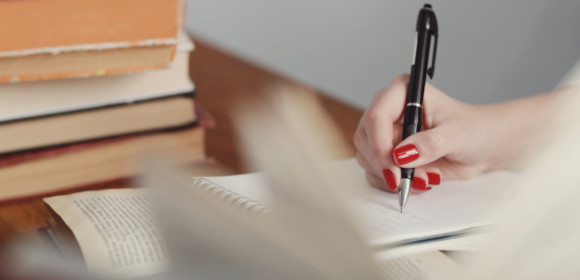
Some would say that literature has been the foundation of life. It has the ability to emphasize worldly issues and human cataclysm. These are written in paragraphs that makes our minds imagine things based on what the context is showing us. It enables every individual to see what others may perceive and even make other living being like animals and plants to be characters of a particular piece. Literature provided each one a chance to catch a lesson about life experiences from the tragic stories to the happiest one.
In this article, we will be going to talk about literature essay . As we have known, all essays follows the same structure which is the introduction, body paragraphs and conclusion. Writing an essay would not require much as long as you are able to comply with what is being required. See examples of other essays like expository essay , narrative essay and more.
10+ Literature Essay Examples
1. literature analysis essay.
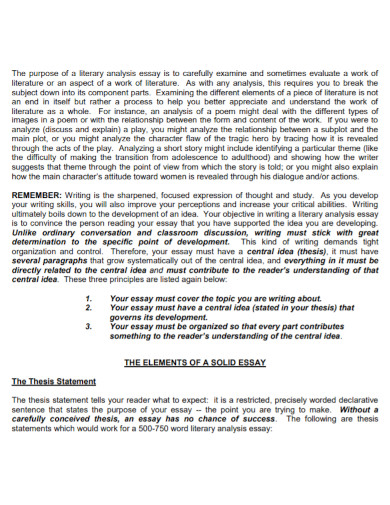
Size: 93 KB
2. Automated Literature Essay
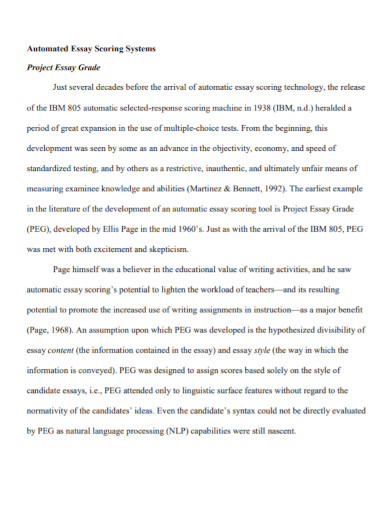
Size: 340 KB
3. Modern Literature Essay
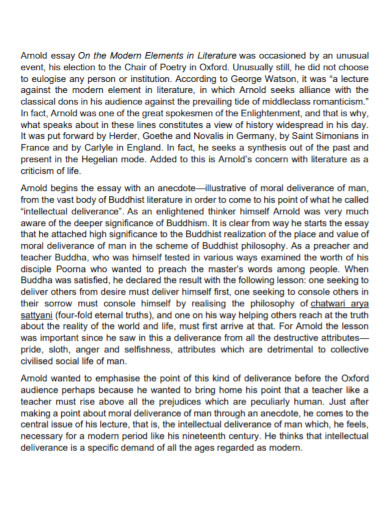
Size: 115 KB
4. Critical Literature Essay
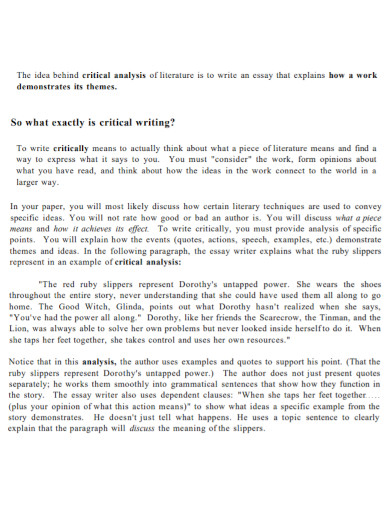
Size: 23 KB
5. Organization Literature Essay
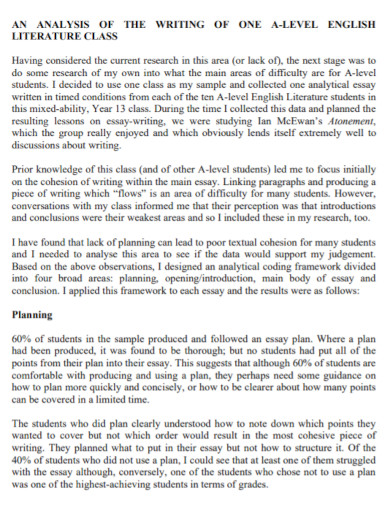
Size: 62 KB
6. Literature Essay Template
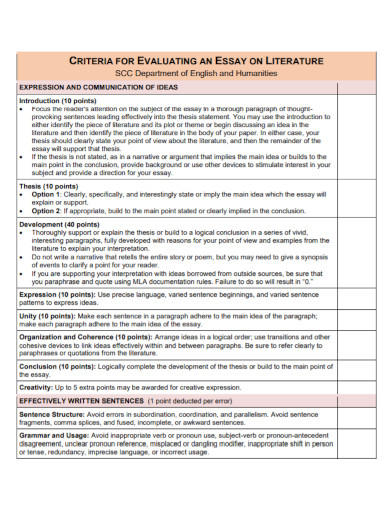
Size: 82 KB
7. Outline Structure for Literary Essay
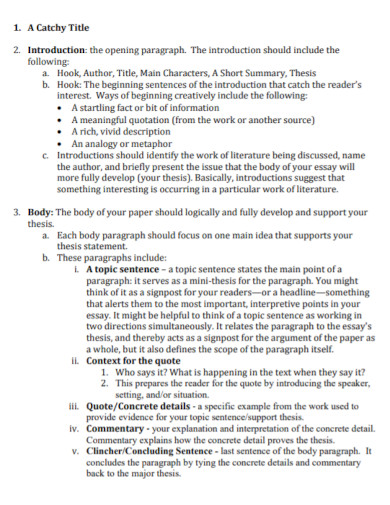
Size: 229 KB
8. University Literature Essay
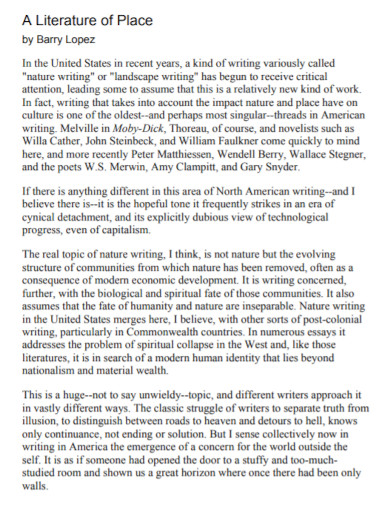
Size: 106 KB
9. Novelist Literature Essay
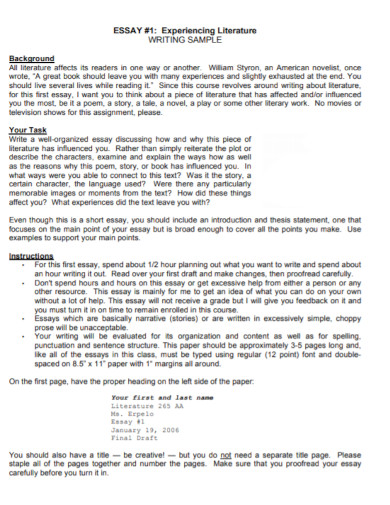
Size: 87 Kb
10. English Literature Essay
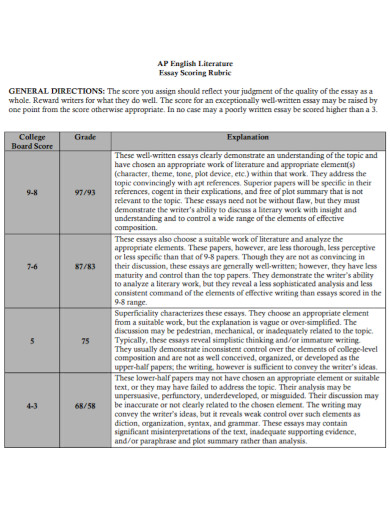
Size: 44 KB
11. Basic Literature Essay
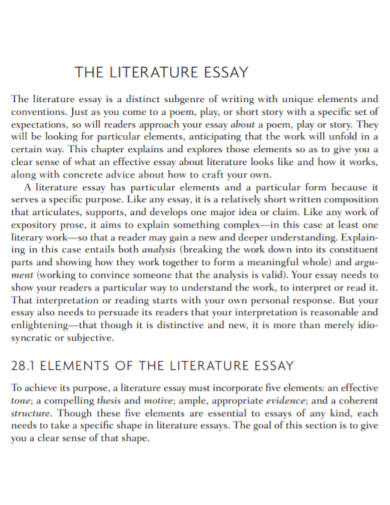
What is a Literature Essay?
A literature essay is an academic work that is written commonly with the existence of literature writings or piece or an analysis. It may examine or evaluate a particular literary work. It also tells about the theme of it. Literary essays maybe all about any writings such as books or anything related to literature.
This type of paper needs a particular format to follow. When engaging yourself with an academic writing , you also have to maintain a specific writing style. You can’t write like a journalist or a blogger. All you have to be is an essay writer that reads various literary books to create a literature essay for your target readers.
Basically, you have to follow some steps that will help you achieve a good literary essay. You have to understand the purpose of a literary analysis and its format, create a plan with regards to your writing activity, begin to write and don’t forget to edit in case there are possible errors that needs certain changes.
Also, consider this elements that would help your essay be organized. Know your subject, the form, your writing style, the theme, the relationship between the form and content and the main plot and subplot, the characters’ strengths and weaknesses and the storyline strengths and weaknesses.
How to Start your Literature Essay?
It is better to be aware of all the elements and structure an essay should include. It will be much easier for you to begin with your literary essay outline . The question now is “how do you start?”
In your introduction, it is always your goal to grab the attention of your readers. Bring the focus to the main point or main idea of your essay. You may also start with using a quote from a famous author. You are also allowed to put some background information about the literary piece you are analyzing. Don’t forget to include a thesis statement to maintain clarity within your work.
How to End your Literature Essay?
Every essay needs a strong conclusion. This should be able to convince all of your readers. How do you write a conclusion of your essay?
Do not try to attempt introducing new ideas in your conclusion. The main role of your conclusion is to give a summary and a restatement of your main ideas. It could also be making necessary comments that is in lined with your perspective.
What is the minimum number of paragraphs in an essay?
Normally, essays would usually have a minimum of three to four paragraphs.
In writing a literature essay, what should your title indicate?
Your title should indicate what you mostly focus on. It is best to keep it concise as possible.
Where do we usually put out topic sentence?
Topic sentences should be placed at the beginning of your paragraph.
Writing a literary essay is not an easy thing to do. You have to keep your focus on the main idea and at the same time fill in the necessary contents needed in every outline. As we grow older, we begin to discover every good aspect a literature has and what makes it special.
Literature Essay Generator
Text prompt
- Instructive
- Professional
Write about the influence of historical context on a literary work in your Literature Essay.
Discuss the evolution of a literary genre in your Literature Essay.
Essays About Literature: Top 6 Examples and 8 Prompts
Society and culture are formed around literature. If you are writing essays about literature, you can use the essay examples and prompts featured in our guide.
It has been said that language holds the key to all human activities, and literature is the expression of language. It teaches new words and phrases, allows us to better our communication skills, and helps us learn more about ourselves.
Whether you are reading poems or novels, we often see parts of ourselves in the characters and themes presented by the authors. Literature gives us ideas and helps us determine what to say, while language gives form and structure to our ideas, helping us convey them.
6 Helpful Essay Examples
1. importance of literature by william anderson, 2. philippine literature by jean hodges, 3. african literature by morris marshall.
- 4. Nine Questions From Children’s Literature That Every Person Should Answer by Shaunta Grimes
5. Exploring tyranny and power in Macbeth by Tom Davey
6. guide to the classics: homer’s odyssey by jo adetunji, 1. the importance of literature, 2. comparing and contrasting two works of literature , 3. the use of literary devices, 4. popular adaptations of literature, 5. gender roles in literature, 6. analysis of your chosen literary work, 7. fiction vs. non-fiction, 8. literature as an art form.
“Life before literature was practical and predictable, but in the present-day, literature has expanded into countless libraries and into the minds of many as the gateway for comprehension and curiosity of the human mind and the world around them. Literature is of great importance and is studied upon as it provides the ability to connect human relationships and define what is right and what is wrong.”
Anderson writes about why an understanding of literature is crucial. It allows us to see different perspectives of people from different periods, countries, and cultures: we are given the ability to see the world from an entirely new lens. As a result, we obtain a better judgment of situations. In a world where anything can happen, literature gives us the key to enacting change for ourselves and others. You might also be interested in these essays about Beowulf .
“So successful were the efforts of colonists to blot out the memory of the country’s largely oral past that present-day Filipino writers, artists and journalists are trying to correct this inequity by recognizing the country’s wealth of ethnic traditions and disseminating them in schools through mass media. The rise of nationalistic pride in the 1960s and 1970s also helped bring about this change of attitude among a new breed of Filipinos concerned about the “Filipino identity.””
In her essay, Hodges writes about the history of Philippine literature. Unfortunately, much of Philippine literary history has been obscured by Spanish colonization, as the written works of the Spanish largely replaced the oral tradition of the native Filipinos. A heightened sense of nationalism has recently led to a resurgence in Filipino tradition, including ancient Philippine literature.
“In fact, the common denominator of the cultures of the African continent is undoubtedly the oral tradition. Writing on black Africa started in the middle Ages with the introduction of the Arabic language and later, in the nineteenth century with introduction of the Latin alphabet. Since 1934, with the birth of the “Negritude.” African authors began to write in French or in English.”
Marshall explores the history of African literature, particularly the languages it was written over time. It was initially written in Arabic and native languages; however, with the “Negritude” movement, writers began composing their works in French or English. This movement allowed African writers to spread their work and gain notoriety. Marshall gives examples of African literature, shedding light on their lyrical content.
4. Nine Questions From Children’s Literature That Every Person Should Answer by Shaunta Grimes
“ They asked me questions — questions about who I am, what I value, and where I’m headed — and pushed me to think about the answers. At some point in our lives, we decide we know everything we need to know. We stop asking questions. To remember what’s important, it sometimes helps to return to that place of childlike curiosity and wonder.”
Grimes’ essay is a testament to how much we can learn from literature, even as simple as children’s stories. She explains how different works of children’s literature, such as Charlotte’s Web and Little Women, can inspire us, help us maximize our imagination, and remind us of the fleeting nature of life. Most importantly, however, they remind us that the future is uncertain, and maximizing it is up to us.
“This is a world where the moral bar has been lowered; a world which ‘sinks beneath the yoke’. In the Macbeths, we see just how terribly the human soul can be corrupted. However, this struggle is played out within other characters too. Perhaps we’re left wondering: in such a dog-eat-dog world, how would we fare?”
The corruption that power can lead to is genuine; Davey explains how this theme is present in Shakespeare’s Macbeth . Even after being honored, Macbeth still wishes to be king and commits heinous acts of violence to achieve his goals. Violence is prevalent throughout the play, but Macbeth and Lady Macbeth exemplify the vicious cycle of bloodshed through their ambition and power.
“Polyphemus is blinded but survives the attack and curses the voyage home of the Ithacans. All of Odysseus’s men are eventually killed, and he alone survives his return home, mostly because of his versatility and cleverness. There is a strong element of the trickster figure about Homer’s Odysseus.”
Adetunji also exposes a notable work of literature, in this case, Homer’s Odyssey . She goes over the epic poem and its historical context and discusses Odysseus’ most important traits: cleverness and courage. As the story progresses, he displays great courage and bravery in his exploits, using his cunning and wit to outsmart his foes. Finally, Adetunji references modern interpretations of the Odyssey in film, literature, and other media.
8 Prompts for Essays About Literature
In your essay, write about the importance of literature; explain why we need to study literature and how it can help us in the future. Then, give examples of literary works that teach important moral lessons as evidence.
For your essay, choose two works of literature with similar themes. Then, discuss their similarities and differences in plot, theme, and characters. For example, these themes could include death, grief, love and hate, or relationships. You can also discuss which of the two pieces of literature presents your chosen theme better.

Writers use literary devices to enhance their literary works and emphasize important points. Literary devices include personification, similes, metaphors, and more. You can write about the effectiveness of literary devices and the reasoning behind their usage. Research and give examples of instances where authors use literary devices effectively to enhance their message.
Literature has been adapted into cinema, television, and other media time and again, with series such as Lord of the Rings and Harry Potter turning into blockbuster franchises. Explore how these adaptations diverge from their source material yet retain the key themes the writer composed the work with in mind. If this seems confusing, research first and read some essay examples.
Literature reflects the ideas of the period it is from; for example, ancient Greek literature, such as Antigone, depicts the ideal woman as largely obedient and subservient, to an extent. For your essay, you can write about how gender roles have evolved in literature throughout the years, specifically about women. Be sure to give examples to support your points.
Choose a work of literature that interests you and analyze it in your essay. You can use your favorite novel, book, or screenplay, explain the key themes and characters and summarize the plot. Analyze the key messages in your chosen piece of literature, and discuss how the themes are enhanced through the author’s writing techniques.

Literature can be divided into two categories: fiction, from the writer’s imagination, and non-fiction, written about actual events. Explore their similarities and differences, and give your opinion on which is better. For a strong argument, provide ample supporting details and cite credible sources.
Literature is an art form that uses language, so do you believe it is more effective in conveying its message? Write about how literature compares to other art forms such as painting and sculpture; state your argument and defend it adequately.
Tip: If writing an essay sounds like a lot of work, simplify it. Write a simple 5 paragraph essay instead.
For help picking your next essay topic, check out the best essay topics about social media .

Martin is an avid writer specializing in editing and proofreading. He also enjoys literary analysis and writing about food and travel.
View all posts
- UWF Libraries
Literature Review: Conducting & Writing
- Sample Literature Reviews
- Steps for Conducting a Lit Review
- Finding "The Literature"
- Organizing/Writing
- APA Style This link opens in a new window
- Chicago: Notes Bibliography This link opens in a new window
- MLA Style This link opens in a new window
Sample Lit Reviews from Communication Arts
Have an exemplary literature review.
- Literature Review Sample 1
- Literature Review Sample 2
- Literature Review Sample 3
Have you written a stellar literature review you care to share for teaching purposes?
Are you an instructor who has received an exemplary literature review and have permission from the student to post?
Please contact Britt McGowan at [email protected] for inclusion in this guide. All disciplines welcome and encouraged.
- << Previous: MLA Style
- Next: Get Help! >>
- Last Updated: Mar 22, 2024 9:37 AM
- URL: https://libguides.uwf.edu/litreview

IMAGES
VIDEO
COMMENTS
Table of contents. Step 1: Reading the text and identifying literary devices. Step 2: Coming up with a thesis. Step 3: Writing a title and introduction. Step 4: Writing the body of the essay. Step 5: Writing a conclusion. Other interesting articles.
Get a sense of what to do right with this literary analysis essay example that will offer inspiration for your own assignment.
Literary Analysis: Sample Essay. We turn once more to Joanna Wolfe's and Laura Wilder's Digging into Literature: Strategies for Reading, Writing, and Analysis (Boston: Bedford/St. Martin's, 2016) in order to show you their example of a strong student essay that has a strong central claim elucidated by multiple surface/depth arguments ...
Heather Ringo & Athena Kashyap. City College of San Francisco via ASCCC Open Educational Resources Initiative. Table of contents. Example 1: Poetry. Example 2: Fiction. Example 3: Poetry. Attribution. The following examples are essays where student writers focused on close-reading a literary work.
An essay (ES-ey) is a nonfiction composition that explores a concept, argument, idea, or opinion from the personal perspective of the writer. Essays are usually a few pages, but they can also be book-length. Unlike other forms of nonfiction writing, like textbooks or biographies, an essay doesn't inherently require research. Literary essayists are conveying ideas in a more informal way.
Literary analysis involves examining all the parts of a novel, play, short story, or poem—elements such as character, setting, tone, and imagery—and thinking about how the author uses those elements to create certain effects. A literary essay isn't a book review: you're not being asked whether or not you liked a book or whether you'd ...
A literary analysis essay is an important kind of essay that focuses on the detailed analysis of the work of literature. The purpose of a literary analysis essay is to explain why the author has used a specific theme for his work. Or examine the characters, themes, literary devices, figurative language, and settings in the story.
Step 1: Read the Text Thoroughly. Literary analysis begins with the literature itself, which means performing a close reading of the text. As you read, you should focus on the work. That means putting away distractions (sorry, smartphone) and dedicating a period of time to the task at hand.
Your literary analysis essay should have a concluding paragraph that gives your essay a sense of completeness and lets your readers know that they have come to the end of your paper. Your concluding paragraph might restate the thesis in different words, summarize the main points you have made, or make a relevant comment about the ...
There are two forms of essay: literary and non-literary. Literary essays are of four types: Expository Essay - In an expository essay, the writer gives an explanation of an idea, theme, or issue to the audience by giving his personal opinions. This essay is presented through examples, definitions, comparisons, and contrast.; Descriptive Essay - As it sounds, this type of essay gives a ...
V. Examples of Essays in Literature Example 1. Sir Francis Bacon was a leading philosopher who influenced the colonies in the 1600s. Many of America's founding fathers also favored his philosophies toward government. Bacon wrote an essay titled "Of Nobility" in 1601, in which he defines the concept of nobility in relation to people and ...
Before writing a single word, brainstorm. Do some free-thinking. Get your ideas down on paper or sticky notes. Cross things out; refine. Allow your planning to be led by ideas that support your argument. Use different colour-coded sticky notes for your planning.
For example, do not accept interpretations in critical works as matters of fact; demonstrate to the reader of your essay the ways in which ... Clarity and expressiveness of language is obviously particularly important in essays on literature, and the development of an accurate and engaging writing style is one of the aims of a degree in this ...
Compare and Contrast Essay Basics. The Compare and Contrast Essay is a literary analysis essay, but, instead of examining one work, it examines two or more works. These works must be united by a common theme or thesis statement. For example, while a literary analysis essay might explore the significance of ghosts in William Shakespeare's Hamlet ...
Examples of Compare and Contrast Essays. 1. Timandra Harkness, "Nature and Nurture, Then and Now" Harkness compares the treatment of the nature vs. nurture question in two films: the 2011 documentary Project Nim, which is about a chimpanzee learning sign language, and the 1970 feature film L'Enfant Sauvage, about a doctor's encounters with a feral child.
What is a Literature Essay? A literature essay is an academic work that is written commonly with the existence of literature writings or piece or an analysis. It may examine or evaluate a particular literary work. It also tells about the theme of it. Literary essays maybe all about any writings such as books or anything related to literature.
8 Prompts for Essays About Literature. 1. The Importance of Literature. In your essay, write about the importance of literature; explain why we need to study literature and how it can help us in the future. Then, give examples of literary works that teach important moral lessons as evidence. 2.
Finding "The Literature" Organizing/Writing; APA Style This link opens in a new window; Chicago: Notes Bibliography This link opens in a new window; MLA Style This link opens in a new window; Sample Literature Reviews. Sample Lit Reviews from Communication Arts; Have an exemplary literature review? Get Help!